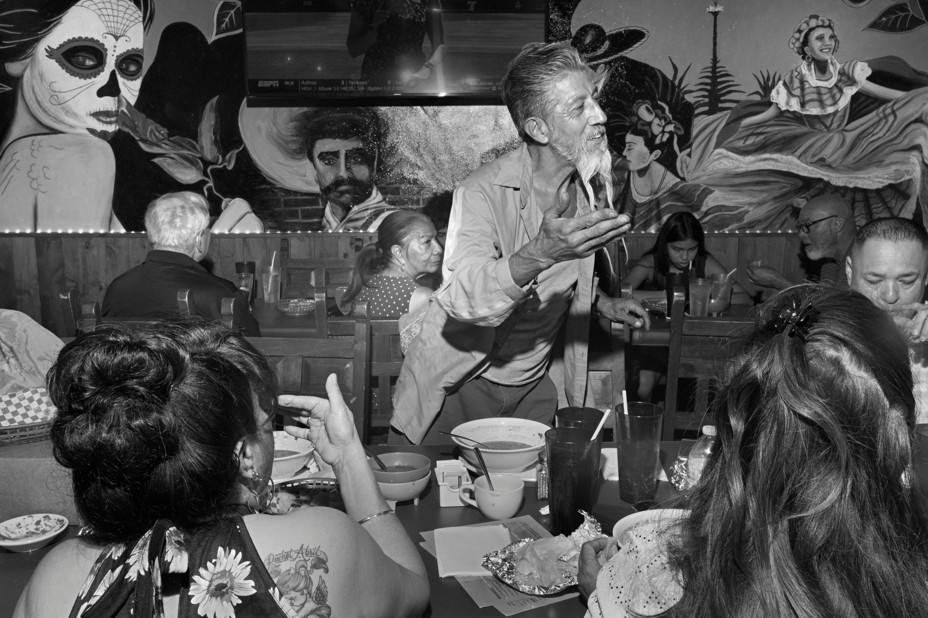Photographs by Philip Montgomery
Have you ever met someone who’s watching their life’s work—their very legacy—fall apart in front of their eyes? I’m talking to two of them right now.
Earl and Mary Rose Wilcox spent the morning juggling plates of chorizo and shouting orders in Spanish toward the kitchen behind them. Now they’re catching their breath in a corner booth at El Portal, the South Phoenix restaurant they’ve run for two decades. They point out the members of their family depicted in a mural on the nearby wall, retracing the mission that brought them to this place and wondering aloud how it all went wrong.
I came to Arizona looking to answer the question of why, over the past few years, so many Hispanics have fled the Democratic Party. This exodus is evident across numerous counties, congressional districts, and battleground states, but the stakes seem highest in Arizona, where Republicans are promoting a slate of extremist candidates and counting on Hispanic voters to help put them in office.
What I found is Earl and Mary Rose, a couple in their mid-70s and the twin bosses of a Phoenix political machine, reckoning with the same awful conclusion I have heard from so many Hispanics, both here and around the country. “The party doesn’t care about us,” Mary Rose tells me. “They pretend to care every two years.”
When Earl and Mary Rose bought El Portal in 1999, in the working-class barrio of Grant Park, they didn’t know much about running a kitchen. Earl had been one of few Hispanic lawmakers in the state legislature; Mary Rose broke barriers twice, as the first Hispanic woman ever elected to the city council and the Maricopa County Board of Supervisors. But the Wilcoxes envisioned the cramped, dusky dining room of El Portal as more than a place for cheap tacos and tequila; it would be a de facto headquarters for the city’s Hispanic Democrats. There weren’t many of them. But Earl and Mary Rose knew that was about to change.
The Hispanic population was just beginning to boom, and the potential of these voters to tip elections toward Democrats—nationally, but particularly in states like Arizona—was becoming more apparent with every campaign. Hispanics are not a monolith, even if the political class treated them as such. The Wilcoxes wanted to harness the political promise of their community. What they didn’t want was to be taken advantage of. They felt that Democrats were prone to patronizing Hispanics, offering noble rhetoric but never a seat at the table. Earl and Mary Rose decided that the only way to advance their interests was to start organizing, creating a base of power separate from the party’s, making the Hispanic vote so essential that no Democrat could win without it.
The Wilcoxes staged protests, hosted candidate events, ran voter-registration drives, transported voters to the polls. Yet the next two decades brought little but defeat: Two losing battles over comprehensive immigration reform. The signing of S.B. 1070, Arizona’s law codifying racial profiling. Perpetual conflict with Sheriff Joe Arpaio, who terrorized Hispanic neighborhoods with “round-ups” and targeted his political opponents. (He once indicted Mary Rose; she and Earl sued him and the county for violating their civil rights, resulting in a $975,000 settlement.) And then there was Donald Trump’s ascension to the presidency.
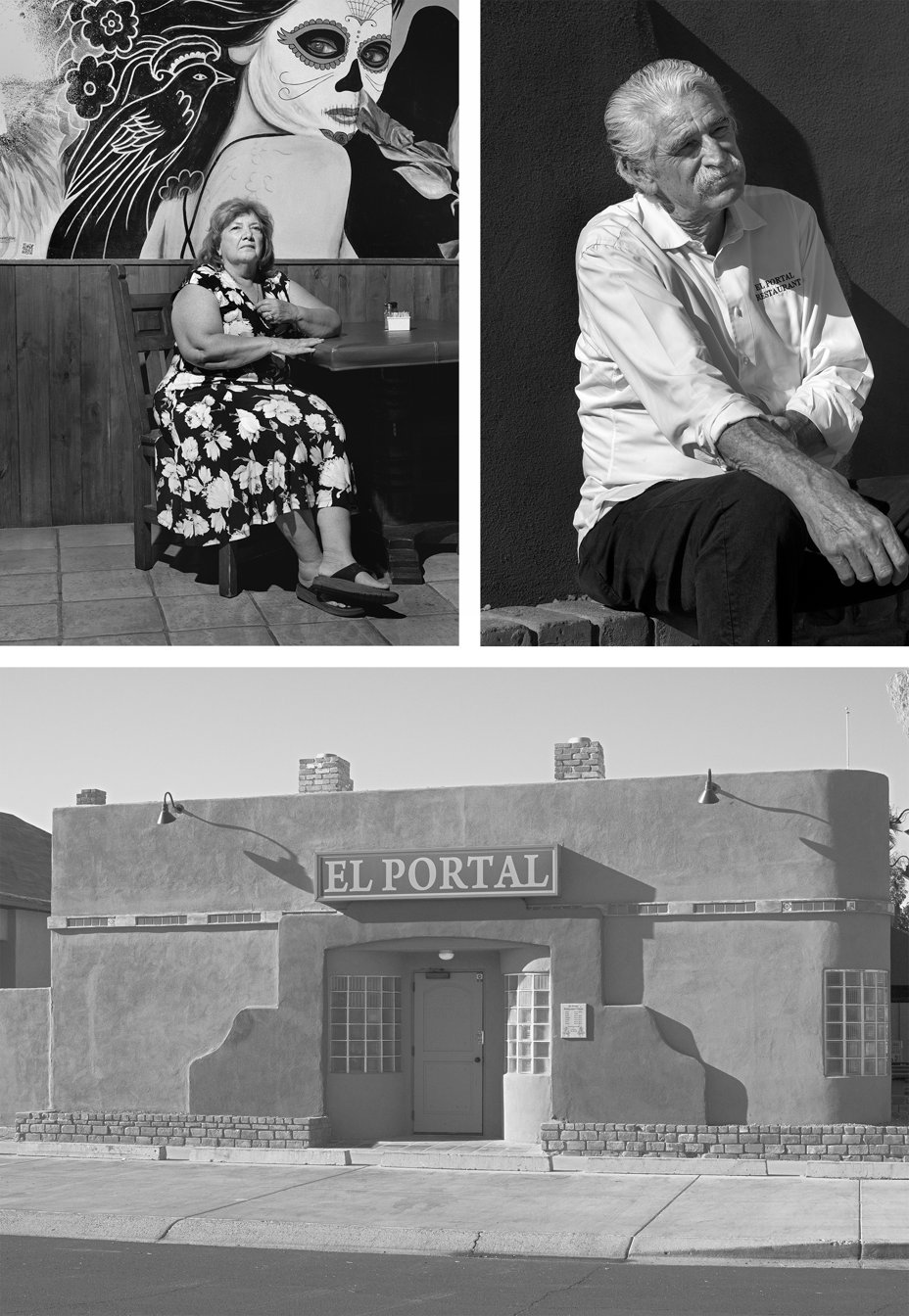
Finally, in 2020, a breakthrough: Joe Biden didn’t just win the election, he won Arizona, only the second time since Harry Truman’s administration that a Democrat had carried the state. Given Biden’s winning margin—three-tenths of a percentage point—and the unprecedented turnout of Hispanic voters, there could be no disputing who had delivered Arizona to the president-elect.
The state’s Hispanic population had tripled since 1990, but Republicans had spent those years doubling down on the harsh policing and immigration policies that appealed to their white conservative base. Earl and Mary Rose had spent decades waiting for the GOP’s bill to come due. On Election Night 2020, they toasted to a new era.
And then the strangest thing happened. People started coming into El Portal to vent their frustrations and unload their grievances—against the Democratic Party.
“Our community, we may not be educated at the highest levels, but we have a lot of street smarts. We know when people are bullshitting us,” Earl tells me, motioning to the people sitting around us. “You know what they say to Democrats now? ‘Es pura cábula.’ Bunch of bullshit.”
Over the past few years, Hispanics have begun abandoning the Democratic Party, defying generations of political patterns and causing varying degrees of panic on the left. In the 2018 midterm elections, when Democrats regained control of the U.S. House of Representatives, they won the Hispanic vote by 40 points nationally. In 2020, Democrats still carried the vote by an estimated 33 points against Trump himself, though the party’s margin against GOP candidates nationwide shrank to 27 points. This summer, numerous polls showed Hispanics splitting in a statistical tie between the two parties. Even if such findings are exaggerated—several recent surveys have shown Democrats reestablishing an advantage among these voters—it’s evident that Republicans are poised next week to win their biggest share of Hispanics in the modern era.
Whether this translates into outright GOP victories is harder to predict, given the party’s continued hemorrhaging of white suburban voters. Indeed, this is what makes the implications of a Hispanic partisan realignment so profound: At a moment when Democrats have begun to dominate the affluent, college-educated vote that for decades formed the cornerstone of the Republican coalition, perhaps the only thing that can keep the GOP competitive is an infusion of support from the very middle- and working-class Hispanics who were, at this moment in history, supposed to deliver the Democrats a foolproof majority.
Given the ferocity of the criticisms Earl relays to me from his patrons—Democrats are insufficiently patriotic; they are elitist in their cultural sensibilities; and they are oblivious to the struggles and priorities of working people—I ask the obvious question: How durable is his party’s hold on the Hispanic vote?
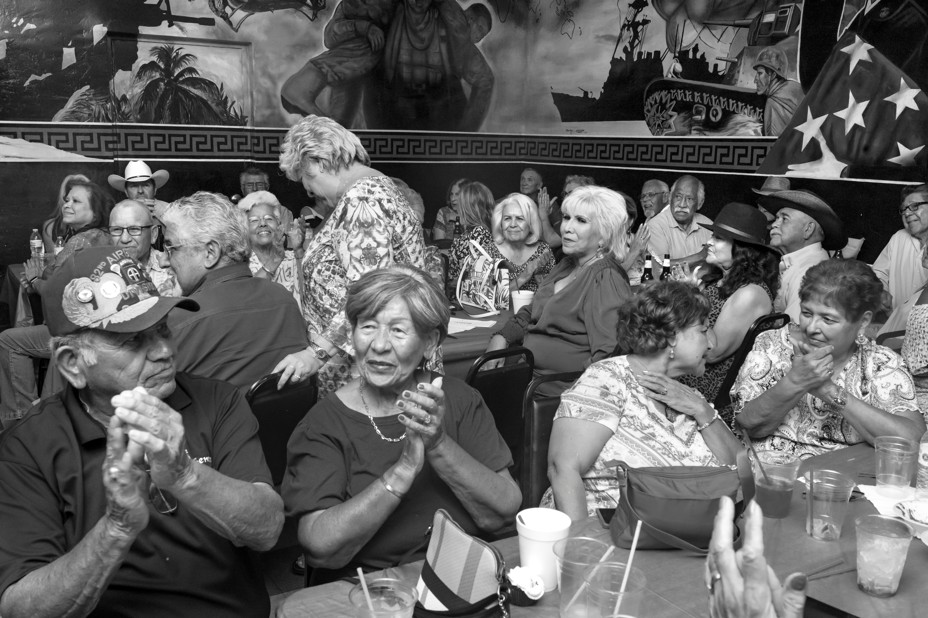
He thinks for a moment. There’s a professor from Arizona State, he tells me, who comes by often. One recent morning, after overhearing some of Earl’s regulars sounding off on the Democratic Party over breakfast, the professor pulled him aside. He could sense that Earl was anxious, and told him not to worry. Whatever gains the GOP was making were bound to be temporary. Hispanics, the professor told him, would never abandon the Democratic Party.
Earl shakes his head. “I’m not so sure anymore,” he says.
The Democrats’ predicament today is 20 years in the making.
It’s almost hard to remember now, but in 2002, Democrats were deep in the minority. The president, George W. Bush, was immensely popular, and the GOP was about to win strong congressional majorities in the midterms. There was no easy path back to power for Democrats. Salvation arrived in the form of a book, written by the political scientist Ruy Teixeira and the journalist John B. Judis, called The Emerging Democratic Majority. The book, which analyzed evolving social structures relative to voting behaviors, argued that because America was becoming more educated, more urban, more secular, and more diverse, Democrats were “on the verge of establishing the same kind of ‘lock’ on the electoral college that the Republicans enjoyed in the 1980s.”
On the left, the book was treated as something akin to divine prophecy. Though Teixeira and Judis took pains to avoid having their work reduced to an end-of-white-America analysis, it was inevitable: The book documented how, every election cycle, minorities were increasing as a share of the overall electorate while non-college-educated white voters were decreasing at an even faster clip. A phrase that appeared nowhere in the book—“Demographics are destiny”—became a kind of support-group mantra for progressives whose consolation after Bush’s reelection in 2004 was the assurance of a long game that was already being won.
“It took hold because, let’s face it, this was something Democrats really wanted to hear,” Teixeira, a Democrat himself, told me this summer. “And so, of course, when Obama got elected in 2008, it was viewed as a validation of that analysis—even though Obama’s election was more complicated than that.”
Democrats had won big among nonwhite voters since the signing of the Civil Rights Act in 1964. What set apart Barack Obama’s victory wasn’t necessarily his margins—he carried two-thirds of Hispanics, per exit polls, and 95 percent of Blacks—but the mass mobilization of these and other groups that had historically gone underrepresented. Obama assembled “a coalition of the ascendant,” as my colleague Ron Brownstein put it, cornering the demographics—young people, women with college degrees, and minorities, particularly Hispanics—that were emerging as the future of the electorate. By emphasizing these groups, by elevating them and celebrating their inclusion in the party’s coalition, Democrats were portraying themselves as the party of a new America.
When Obama put that same winning coalition back together in 2012, running up the same crushing margins among nonwhite voters, “Demography is destiny” became conventional wisdom, and not just on the left. Two days after Mitt Romney’s defeat, Fox’s Sean Hannity called for comprehensive immigration reform, complete with a path to citizenship, lest Hispanic voters usher Republicans into permanent minority status. The national GOP commissioned an autopsy report focused on repairing the relationship with Hispanics. Senator Lindsey Graham, who led a team of Republicans on a doomed mission to fix the nation’s immigration laws, warned that his party was entering “a demographic death spiral.”
But neither the left nor the right really understood Hispanics, who were motivated by different issues than were Blacks—to the extent that they could be accurately categorized at all. In Florida alone, Cubans are generally more conservative than Colombians, who are generally more conservative than Puerto Ricans; the Mexicans who live across the Southwest have distinct ideological profiles that depend on how long they’ve been in the United States. All the emphasis on nonwhites, and the GOP’s inability to win them, made it hard to see the very different reasons that different blocs had for supporting Democrats—or their different degrees of partisan loyalty.

“In my opinion, the Latino vote has always had a swing dimension to it,” says Carlos Odio, a former Obama aide who specialized in Hispanic outreach and in 2019 co-founded the Miami-based firm Equis Labs. “Now, it just so happened to swing the same way over a series of elections. It’s like a coin flip landed on heads, over and over again, for a variety of reasons. But we keep thinking the coin will always land on heads. I think it’s a mistake.”
There are two ironies at work. The first is that it required the presidency of Donald Trump—he of the “I love Hispanics!” caption on a Cinco de Mayo tweet, fork digging into a Trump Tower taco bowl—for some Democrats to question their own dogma. Trump was supposed to be uniquely unacceptable to minorities, and to Hispanics in particular, given his assessment of Mexicans as, among other things, “rapists.” Yet Democrats didn’t see major gains with Hispanics during his four years in office. Instead, their margins shrank.
“In the end, the 2020 election wasn’t won by the ‘ascendant’ nonwhite voters at all,” Teixeira told me. “It was the college-educated white voters who won the election for Biden.”
Hence the second irony: The very thing that breathed life into the Democratic Party 20 years ago—the focus on identity and inclusion—is making it more popular with white voters, and less popular with Hispanic voters. (This is what far-right fear merchants like Tucker Carlson fail to grasp: The immigrants demonized by his “Great Replacement” rhetoric are now, in some respects, likelier to vote Republican than the people they are supposedly replacing.)
Democrats like Teixeira believe that the party has become culturally detached from Hispanic voters, moving too far left on issues such as immigration, policing, and transgender rights. Democrats like Odio say the real problem is a “class disconnect” in which Democrats are catering to the cultural concerns of economically secure whites at the expense of the pocketbook priorities of working-class Hispanics.
Neither man is wrong. Hispanics are leaving the Democratic Party for many different reasons. This represents “a sea change” in our politics, Teixeira said, whether his fellow Democrats want to accept it or not. “The idea that what we’re seeing from the Hispanic vote recently is a deviation, and that they will snap back to their historic preference for the Democrats two to one, I think it’s a total illusion,” he said. “The real question is how far this trend goes.”
The timing couldn’t be worse for Democrats. According to Pew Research, the U.S. Hispanic population has grown to 62 million from fewer than 10 million in 1970. (Hispanics accounted for more than half of America’s population growth from 2010 to 2020.) In the last election, Hispanics eclipsed African Americans in terms of raw eligible voters. Hispanics are not yet a national force—their numbers are still diluted in the upper Midwest, for instance—but in several key battleground states, such as Florida, Texas, and Arizona, they have become the most essential, and most coveted, demographic.
“We’re in a game of tug-of-war. There are two sides,” Odio told me. “Democrats are going to lose where they let go of the rope.”
I asked him where Democrats are in the most trouble with Hispanic voters, and Odio didn’t hesitate. It’s the place where he lives: Miami, Florida.
Juan Cuba can still remember the moment he began to worry.
It was 2013, and Democrats were euphoric after Obama’s back-to-back victories. Not only had the president carried Florida in both elections, but he had made a statement in Miami-Dade County, a place crowded with Cuban Americans, who, due to historic distrust of the Democratic Party dating back to John F. Kennedy and the Bay of Pigs, have aligned more with the GOP than have other Hispanics. Obama won the state’s most populous county by 16 points in 2008 and 24 points in 2012. In a place where Republicans had spent a generation building relationships with Hispanic voters—much of it thanks to Jeb Bush, the popular bilingual governor, whose brother ran two ultracompetitive presidential campaigns in Miami-Dade—Obama’s triumphs felt like a watershed.
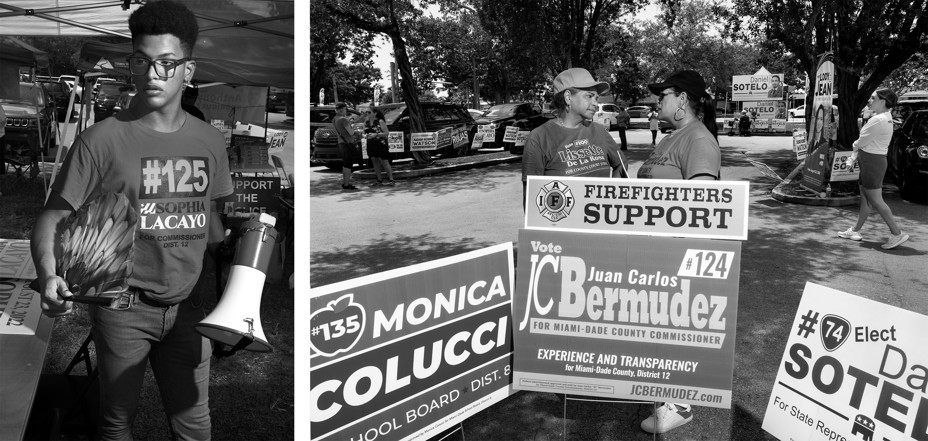
And yet Cuba, who assumed the role of executive director of the Miami-Dade Democratic Party after Obama’s reelection, started seeing red flags. As the 2014 midterm campaign got under way, Democrats spoke with a certainty—bordering on arrogance—about the Hispanic vote being locked up. Those who had turned out for Obama, Cuba told me, were now considered part of the party base. Charlie Crist, the Democratic nominee for governor, campaigned as if Hispanics were a sure thing. They would vote, and they would vote for Democrats.
Crist lost the governor’s race by about 64,000 votes. And although he won Miami-Dade by a sizable margin, turnout lagged relative to both parties’ expectations. “Had we engaged more voters, especially Hispanic voters, we would have won that race,” Cuba said.
When Hillary Clinton clinched the Democratic nomination in 2016, Democrats in South Florida stressed to her team the importance of not repeating that mistake. Clinton poured resources into Miami-Dade, running a ground game that located existing voters, registered new ones, and tracked both to make sure they were casting ballots. Cuba’s concerns about the party’s complacency were assuaged. He had a new worry, however. The messages used by Clinton and her Democratic allies to mobilize Hispanic voters were nothing like what they’d used in the Obama campaigns. There was little about hope and change. It was mostly about fear and victimhood.
“I’m an immigrant myself, and when I think back to what worked on those Obama campaigns, it was really that he spoke to the aspirations of Hispanics. He talked about the American dream. He gave people a sense of how the Democratic Party was about social mobility through hard work,” Cuba said. “But by 2016, we’d become less the party of the American dream, and more the party of anti-Trump.”
It worked, at least initially: Clinton carried Miami-Dade by nearly 30 points against Trump—an unprecedented margin in Florida’s biggest county. But Cuba, who rose to the position of county party chair in 2017, recalls how quickly the anti-Trump message began losing potency. The economy was roaring to life after eight sluggish years of post-recession recovery at the same time that the progressive wing of the Democratic Party, emboldened by Bernie Sanders’s insurgency in 2016, was espousing an open distrust of capitalism and questioning the existence of opportunity and upward mobility in America.
“I’ll never forget, we did a focus group with Hispanic voters in 2019,” Cuba said. “It was clear that a lot of these Hispanics voted against Trump in 2016 because they were scared of him. And by 2019, they weren’t scared anymore.”
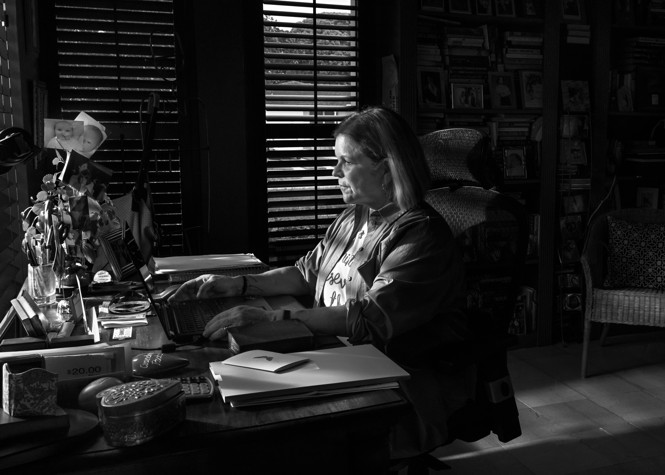
María-Elena López, who held a variety of positions under Cuba in the county party, saw this shift taking place in real time. She believes that there is no real mystery to it: While Trump successfully portrayed himself as a populist achieving hard-won economic growth—signing tax cuts into law, touting a record-shattering stock market, boasting the lowest Hispanic unemployment rate in history—Democrats came across as a bunch of out-of-touch idealogues. Promises of shared social progress, she told me, offend the sensibilities of many first- and second-generation immigrants who hate the idea of government handouts.
“We’re not a political party, we’re a charity. And you know what? These people don’t want charity,” López said. “These immigrants come here to make money and keep their families safe. They are not here because the sea levels are rising, or because of social justice, or anything else. We’re out there talking about racism and the Green New Deal and defunding the police, and we’re freaking them out.”
López is a former Republican who, in the mid-1990s, became estranged from the GOP of her youth. She became an avid Democrat during Obama’s first run, got deeply involved with local party politics, and today serves as first vice chair of the county party. She counts herself as a progressive on nearly every issue. But, López said, many of her fellow progressives don’t appreciate how fundamentally conservative the Hispanic community is—more religious, more entrepreneurial, more working class—relative to the other cogs in the Democratic coalition.
At one point in our conversation, I mentioned to López how the overturning of Roe v. Wade seemed to be muddying forecasts of a Republican romp at the polls in November; how some Democrats, particularly those running in wealthy white suburbs, were gaining momentum in their campaigns by hammering the GOP’s anti-abortion platform. López, who had been quite animated, suddenly lowered her voice.
“You see, that’s a perfect example. I’m telling every single one of my candidates here, do not talk about abortion in this campaign,” López said. “You have a lot of Latinos who are fine with abortion being the law of the land—but they are against it morally. They may not be, quote-unquote, pro-life, but don’t shove the issue in their face. Don’t force them to choose sides. They might not choose the side you would think.”
To some extent, López said, the same principle applies to other issues she feels Democrats are enamored of—green energy and racial justice, individual pronouns and group identities. “What the hell is a ‘Latinx’?” she said, throwing up her arms. “Now we’re inventing language?” (This was but one of the many unsolicited rants I heard against the term Latinx.)
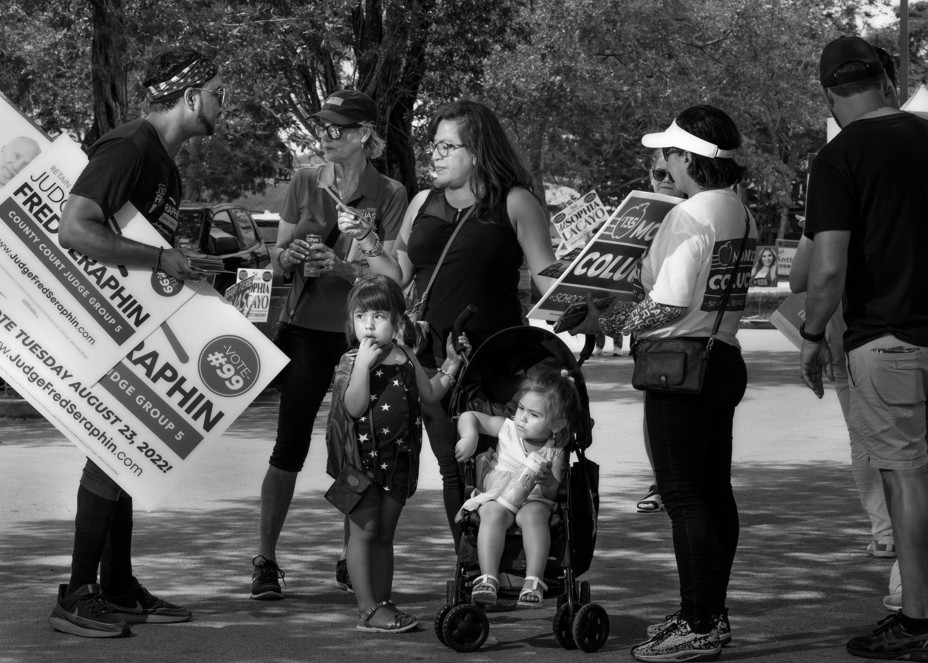
López said it’s all about opportunity cost: Every minute Democrats spend on topics that appeal to small portions of their existing base is time that could have been spent speaking to a single theme that preoccupies voters across the ideological spectrum: jobs, opportunity, upward mobility. “You can still be the party of all those other things,” she said. “Just don’t talk about them so much.”
Of course, the challenge for Democrats isn’t just modulating the message; it’s also combating the right-wing misinformation machine.
When I sat down with Joe Garcia on the narrow, concrete-slabbed patio of a Miami Beach café, the former congressman spoke in fatalistic tones. A political party is only as good as its rhetoric, Garcia told me, and in South Florida, “Democrats are losing the rhetoric war to Republicans—badly.”
Garcia, who was elected alongside Obama in 2012 and represented his native Cuban neighborhoods in western Miami-Dade, said Republicans have always been craftier in delivering their messages on Spanish-language TV and radio. What’s new, he said, is the way conservatives have swarmed the most popular social-media pages and WhatsApp chat groups in his community, relentlessly circulating half-sourced posts that portray the Democratic Party as weak on crime and soft on socialism.

“Look at Biden’s new Cuba policies, for instance,” Garcia said. What the administration announced in the spring—the relaunching of a family-reunification program, increased flights to the island, an easing of restrictions on the money Americans can send and invest there—“should actually be more popular with Cubans than Trump’s hard-line policies,” Garcia said.
But the White House—according to numerous Democrats on the ground—did nothing to coordinate a messaging strategy around these policy changes. Nobody here could get booked on a local news program, or write a social-media post defending the new policies, because they found out about them at the same time everyone in the general public did. As a result, Garcia told me, puffing a massive Cuban cigar, “Democrats are getting killed, every single day, on Spanish-language media here, even though it’s an argument we should be winning.”
This episode reflects a broader intellectual arrogance, Garcia said. The conviction that history and demography are on the Democrats’ side dulls the political instinct of persuasion. “Look, I’m a big fan of Barack Obama. But he turned our party into a religious order,” he said. “When you think you’re right—no, when you know you’re right—everybody should just get it. You stop making the argument.”
Garcia pointed to 2018, when Democrats nominated Andrew Gillum for governor—a candidate endorsed by Bernie Sanders. Garcia and his fellow Democrats in Miami could already recite the attacks on Gillum as a sleeper socialist. When those attacks came, Gillum didn’t do much to dispel them. (When NBC’s Chuck Todd asked if he was a socialist, Gillum replied simply, “No, I’m a Democrat.”) He wound up winning Miami-Dade by 21 points—down from Clinton’s 30-point margin two years before—and lost the election by 32,463 votes statewide. “Let’s face it,” Garcia said. “We lost the governorship to Ron DeSantis because our nominee wouldn’t come out and say, ‘I’m not a goddamn socialist.’”
Democrats here say the national party should have learned a hard lesson from that campaign. Instead, after 2018, the party’s ranks began to swell with influential young progressives, such as New York Representative Alexandria Ocasio-Cortez, who championed far-left policies while openly embracing the socialist label. Moderate Democrats were reluctant to push back. It was a Republican dream come true. By the time Trump ran for reelection in 2020, the GOP had scaled up the socialism attacks nationwide. The reward was clearest in South Florida: Republicans knocked off two Democratic congressional incumbents, and Trump closed the gap in Miami-Dade to seven points, a 23-point swing from the 2016 election.
The name “AOC” came up in dozens of my conversations with Hispanic Democrats around the country, many of whom are struggling to neutralize the socialism charge in their own communities. By turning the young representative into a boogeyman, Garcia told me, Republicans forced Democrats to play defense over labels and abstractions while rendering the left’s version of 21st-century populism unacceptable to a huge swath of the electorate that might otherwise be receptive to it.
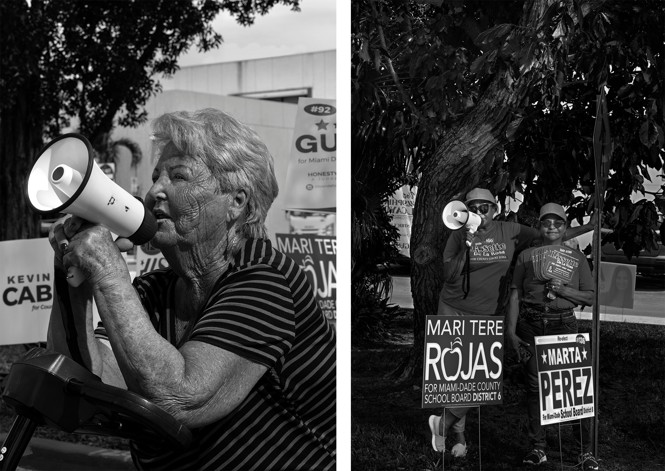
“She is not Vladimir Lenin, Karl Marx, Joseph Stalin, Mao, or anything like that. She’s a classic northeastern liberal who’s pushing a social agenda that, in many respects, has real viability at a time like this,” Garcia said of Ocasio-Cortez. “So, how do you shut down the debate? You engage in name-calling. You use propaganda to scare us from acting on the issues most important to our base.”
He also acknowledges, however, that the Democratic base is changing. Progressive policies—around climate, or guns, or even immigration—might poll well with the liberal, college-educated wing of the party. But they might also continue to alienate the working class, including the Hispanic working class, from the Democratic brand. Days before I sat down with Garcia in Miami Beach, a poll from The New York Times and Siena College showed, for the first time in the survey’s history, that “Democrats had a larger share of support among white college graduates than among nonwhite voters.”
This is what Carlos Odio meant when he told me national Democrats have “let go of the rope” in Miami-Dade County. It wasn’t that his party would no longer compete for votes down there; rather, it was that his party was acknowledging a new reality, in which affluent white voters are a higher political priority than are working-class Hispanics. This would have been unthinkable just five years ago. I asked Garcia if he was comfortable with such a trade-off.
He shrugged. “That’s how we won last time.”
In Bruno Lozano’s blue pickup truck, the air-conditioning whistling through every vent, we stopped and gazed at the Del Rio International Bridge. It was here, Lozano told me, that in September 2021 tens of thousands of Haitian migrants gathered underneath the bridge and set up camp for several days in extreme heat. Del Rio had dealt with migrant waves before, but nothing like this. The city could not handle the influx; its border-processing facilities were at capacity, its humanitarian workers past their breaking point. The community was panicked. Lozano, then the mayor, was desperate. Some of these migrants, he thought, were going to die.
“I’m right here, at the bridge, watching this thing spiral out of control. And Democrats in Washington are like, ‘Nothing to see here,’” Lozano said.

Lozano told me he reached out to every Democratic official he could think of, in Texas and beyond, pleading for any help or resources they could offer. When that failed, he asked them to come visit Del Rio, to at least shine a light on what was happening at the border. “They looked the other way,” Lozano said. “They just pretend it’s not happening.”
[Caitlin Dickerson: Democrats’ free pass on immigration is over]
When he was elected mayor of Del Rio in 2018, Lozano, just 35 years old at the time, fit the profile of a rising star in the Democratic Party. An openly gay Hispanic military veteran, Lozano “checked every box” for the party. Since he had defeated a Republican incumbent just as his county was beginning to turn red, Lozano said, “you would figure Democrats might listen when I’m telling them something is wrong.”
Lozano said he began sounding the alarm almost as soon as Biden took office. He told his fellow Democrats that, for all the damage done by Trump’s cruel border-security policies, a relaxed approach to border enforcement could prove even more disastrous. He warned them of a potential humanitarian or national-security crisis. He told high-ranking party officials in Austin and in Washington—including during a visit to the White House for an LGBTQ pride event—that Hispanics in his community were turning on the Democratic Party, in part because of its indifference to the chaos at the southern border.
He told me they refused to listen. And today, Lozano said, pulling into the parking lot of a Ramada Inn a few miles from the border, the problem is worse than ever.
The Ramada is where locals host wedding receptions, where businesspeople and politicians meet for breakfast, and where, on a blazing July afternoon, the Del Rio Chamber of Commerce was holding its monthly luncheon. There was no vacancy at the hotel; rooms were booked for Border Patrol agents who had flooded into the area to reinforce a sector that was being overrun.
“This is the biggest wave of illegal immigration in American history, and we’re at the epicenter of it here in Del Rio,” Jason Owens, the Border Patrol’s chief patrol agent of the Del Rio sector, announced at the luncheon. “In the last 24 hours, we’ve apprehended 2,240 people in this sector alone.”
The room buzzed. Forty or so people, local entrepreneurs, most of them Hispanic and many of them lifelong Democrats, exchanged looks of dismay. A few expletives could be heard. Owens wasn’t done.
“In fiscal year 2021, we apprehended nearly 260,000 people in the Del Rio sector. That was more than the previous nine fiscal years combined,” Owens said. “This fiscal year … we are already in excess of 330,000 people apprehended in this sector. Last year was record-breaking; this year, we’ve already shattered it.”

Part of this can be attributed to the continued enforcement of Title 42, a Covid-era policy that suspended asylum requests and authorized the automatic expulsion of single adult migrants who hailed from certain countries; many of those migrants have been apprehended and expelled more than once, driving the number of crossings higher. Because of the known gaps in America’s immigration policy, Owens said, many migrants in this area follow a trail to where they know Border Patrol will be waiting. Those who are allowed to stay in the U.S.—because they are not subject to expulsion, or because they have no criminal record—are typically processed, then detained or released, with orders to appear at a future court date.
Owens said it’s the migrants who go out of their way not to get caught—he cited data from video monitoring suggesting that roughly 140,000 people have crossed unmolested in this sector in fiscal year 2022—who worry him the most. Those 140,000 who got away combined with the 330,000 apprehensions makes for 470,000 illegal crossings from October through July—in the Del Rio sector alone. “And there are nine sectors along the southwest border,” Owens said.
When he opened the meeting to questions, person after person demanded to know how this could be happening, who was to blame, and what they could do to punish the political actors responsible.
“How do you feel,” Sarita Perales, an administrator from the local hospital, asked, “about the Biden open-border policy?”
Owens fought a smirk. “The administration will tell you that the border’s not open,” he replied, eliciting groans from the audience.
Technically, the border is not open. But you wouldn’t know it from spending a few days in Del Rio. People I spoke with down there said they’d never seen anything like the mass of humanity moving across the border since Biden became president. In fairness, apprehensions at the southern border began to rise in the spring of 2020 and continued to climb throughout Trump’s final year as president. But the numbers spiked much higher after Biden took office. It’s difficult to examine the policies of his administration—which, according to the left-leaning Migration Policy Institute, “narrowed the scope of immigration enforcement in the U.S. interior” and “adopted something of a new approach to border enforcement”—and dispute the conclusion that Democrats have made it easier for migrants to attempt and complete an unlawful crossing into the U.S., making a historically bad problem much worse.
This is exactly what Perales, a mother of four, feared would happen. Born in Mexico, Perales came to the U.S. legally when she was 7 years old and became a naturalized citizen in 2017. Her first opportunity to vote in a presidential election was in 2020, and she felt “so disappointed with my choices.” Perales grew up in Del Rio, a place with deep Democratic roots. She has progressive sensibilities on many social issues. She hated some of the hard-line policies of the Trump administration, including the forced separation of families at the U.S.-Mexico border. But the more she listened to activists and elected officials on the left, the more worried she became that Democrats would embrace the other extreme—refusing to secure the border at all.

Perales ended up voting for Trump. Despite disagreeing with him and the Republican Party on a host of issues, she told me, she plans to vote a straight-GOP ticket in 2022, because of the chaos Democrats have brought to her community.
“Where is our respect for laws? Where is our respect for the people already here?” Perales said. “I’m an immigrant; I’m also an American. We are allowing our country to be overrun.”
Studies and polling suggest that Hispanics who entered the U.S. legally tend to be more conservative on questions of immigration. Some progressive Hispanics have bemoaned this, likening it to selfishly slamming shut a door behind you. Perales insisted that she doesn’t feel threatened, economically or otherwise, by new immigrants. She understands the hopeless circumstances that drive so many people from impoverished and conflict-ridden countries to make the journey north. What worries her is the perception of “crossing without consequences.” She wants the U.S. to broadcast a stricter approach to immigration, not just for the sake of the rule of law and for the stability of her community, but also for the well-being of those thinking of coming here.
“They’re being treated so inhumanely,” Perales said of the migrants traveling to America. “But it’s the open-borders policy that is leading to that inhumane treatment.”

Joe Frank Martinez, the sheriff of Val Verde County, told me the same thing when I visited his office in Del Rio. A strong show of deterrence at the border, he said, is the decent thing to do. Not a week went by this summer, Martinez said, that he and his deputies didn’t discover a body of someone who had either drowned in the river or perished in the heat. Shortly before my visit, he told me, they recovered four corpses in the span of three days. (I checked the weather app on my phone. It was 106 degrees outside.)
Like most of the sheriffs in South Texas, Martinez is a Democrat. But definitions are a funny thing down there. Many of the residents have ancestral roots in both old Mexico and present-day Texas; they identify as “Tejanos.” In the same way Tejanos here don’t identify with, say, Mexican Americans in Arizona, Democrats here don’t identify with Democrats just about anywhere else. Martinez is pro-life, pro-gun, and generally conservative in ways that don’t mesh with the modern Democratic Party.
He believes that both parties deserve blame for failing to fix a broken immigration system and “put something in place that can reasonably allow people to make a legal entry.” But, Martinez insisted, this present crisis is one of his own party’s making. “Right now, these migrants feel like they’ve got a standing invitation from this administration to cross the border,” he said.
It wasn’t long ago that Democrats ruled South Texas. Today, Martinez told me, “the Democratic strongholds in Del Rio aren’t real Democratic anymore.” Val Verde County, which Democrats carried by an average of eight points in the previous three presidential elections, went for Trump by 10 points in 2020. The Twenty-third Congressional District, which covers Val Verde, is held by a Republican. Just weeks before I arrived in Del Rio, Mayra Flores, a Mexican-born Republican, flipped the Thirty-fourth District—farther to the east, in the Rio Grande Valley—in a special election. (A Democrat had carried the district by double digits in every election since it was redrawn after the 2010 census.) The GOP is favored to flip the neighboring Fifteenth District next week and represent a majority of Texas’s border districts; less than a decade ago, Democrats controlled every single one.
Martinez said most of the Democrats he’s known over the years have become skeptical of the party. For longer than he can remember, he’s had a weekly breakfast with the same group of seven or eight guys at the Ramada. They were always Democrats—all of them. Now, he said, there’s only one holdout. The rest have switched sides.
In the sheriff’s view—and he said it’s part perception, part reality—his party has become too progressive for Hispanics in a community like his. “This talk of defunding the police, it’s had a real impact,” Martinez said, describing the local Hispanic community as ardently pro–law enforcement. Meanwhile, he added, the moderates in his party at the state and national levels aren’t doing enough to push back on the left. Over the past three years, Martinez estimated, he’s given tours of the border to more than 100 members of Congress. “I haven’t had a single Democrat here. Not one,” he said. “And trust me—I’ve invited them.” (Not long after we spoke, Martinez finally welcomed his first congressional Democrat, Darren Soto of Florida, to the border.)

In Lozano’s truck, as we drove on a narrow road that runs parallel to a stretch of border fence—started by the George W. Bush administration, continued under Obama—he was still seething. Progressives exploit the suffering at the southern border to raise money or get booked on television shows, he said, but they won’t actually come see it for themselves. I asked him why.
“Because it’s a romanticized ideology,” Lozano said. “It’s easy for them to romanticize this whole situation. ‘They’re struggling! They need help! They’re coming here for a better life!’ It’s harder for them to come look at bodies of people who died in 107-degree heat. Kids who drowned. Border Patrol agents—who they’re so opposed to—trying to help pregnant mothers. None of this fits their narrative.”
I asked Lozano what he wants Democrats to do about the border crisis. He laughed.
“Democrats refuse to even call it a crisis. They’re gaslighting me,” Lozano said. He ran through a list of requests: more funding for Border Patrol; better technology to monitor movement; more support for humanitarian groups on the ground; stricter processing policies to deter would-be migrants; and, yes, in certain places, reinforced physical barriers. Above all, he wants Democrats to stop signaling that America has an open border. Throughout the 2020 Democratic presidential primary campaign, he noted, the party’s aspiring leaders took a host of positions—on decriminalizing border crossings, or providing health insurance to undocumented immigrants—that broke with decades of orthodoxy, to appease the progressive base.
“I’m all about the American dream. But this is unsustainable, just totally unsustainable,” Lozano said. “Government is supposed to be about stability. But this party, my party, is inviting all this instability. I’ve had enough.”
Lozano is no longer the mayor of Del Rio. This summer, just a few weeks before I came to town, he served his last day in office. Once a promising young prospect in the Democratic ranks, he quit electoral politics, walking away from a job he loved. Now, he’s thinking about quitting the Democratic Party, too.
Danny Ortega is a legend in local progressive circles and a member of Arizona’s Democratic Party Hall of Fame. As an activist and civil-rights attorney, he has spent decades working in households and neighborhoods where voting is a foreign behavior, and where fear of filling out government forms runs deep, pleading with first- and second-generation Hispanics to get involved with politics. Around the time Obama was first elected, Ortega told me, he sensed a turning point. The GOP’s overt targeting of the Hispanic community—via legislation and law enforcement, rhetoric and rumormongering—helped embolden citizens to finally turn out to vote, and to vote for Democrats. The floodgates had opened. Demography, at last, was going to be destiny.
Until it wasn’t.
“The past few years, our young people have been registering as independents. More than 50 percent of them. We have the data,” Ortega said. “These voters, the future of our community, they are abandoning us. And honestly,” he paused, with a grimace, “I don’t blame them.”

We sat in Ortega’s first-floor law office in Phoenix, now the nation’s fifth-largest city thanks to a mass influx of immigrants, most of whom are Mexican. Surrounded by framed awards and photos with politicians, Ortega was leaning across his desk, sweating through his Hawaiian shirt, shouting mostly at himself. For too long, Ortega said, Democrats have refused to spend real time and resources in the Hispanic community, checking a box during campaign season but rarely engaging between elections. When Democrats do come calling, he said, they treat Hispanics like children: speaking in paternalistic tones about what’s good and bad for them economically; assuming simple and monolithic views on social issues; pandering shamelessly on immigration and promising sweeping reforms that never materialize.
More and more, Ortega told me, Hispanics are suspicious of his party. They question whether Democrats want to solve a problem like immigration; whether they would rather continue to wield themes of racism and xenophobia to mobilize voters against the GOP; whether moral outrage is simply the means to a political end. In his view, the Democratic Party has a credibility crisis, and it’s not specific to immigration. Ortega said that so many adjacent Democratic causes—voting rights, LGBTQ rights, abortion rights—are viewed skeptically, particularly by younger Hispanics, who perceive Democrats as manipulative at worst and tone-deaf at best. Even if their social-justice efforts are regarded as genuine, Democrats are pushing an agenda that doesn’t resonate with a wide array of voters during this time of economic uncertainty.
“A lot of Latinos, they’re just not moved by these issues,” he said. “They may think Republicans are racist, but some of them are going to vote for the Republicans anyway, because they’re better on the economy, better on small business, better on regulation.”
César Chávez hears it all the time. A member of the Arizona House who represents the most concentrated community of Hispanics in the state, Chávez finds himself engaged in a daily struggle to hold the line for the Democratic Party.
“It’s very hard for an individual to vote for somebody who leans more on social justice than on the economy,” Chávez told me in a coffee shop not far from the state capitol. “When a person has to choose between paying for a gallon of milk or a gallon of gas, every other issue goes out the window.”
Chávez was born in Mexico. When he was 3 years old, he and his pregnant mother crossed the desert and found their way to Pennsylvania, where his father, who had also immigrated illegally, was working on a mushroom farm. Chávez was raised alongside Amish children and “fell in love with America,” cherishing the traditional values of his community. Because it was Ronald Reagan’s amnesty program that eventually granted his father citizenship—allowing the rest of the family to eventually follow suit—Chávez felt a kinship with the GOP. It wasn’t until his family moved to Phoenix that Chávez experienced real discrimination. He came to feel that the Democratic Party, with its emphasis on inclusion, was the natural home for people like him.
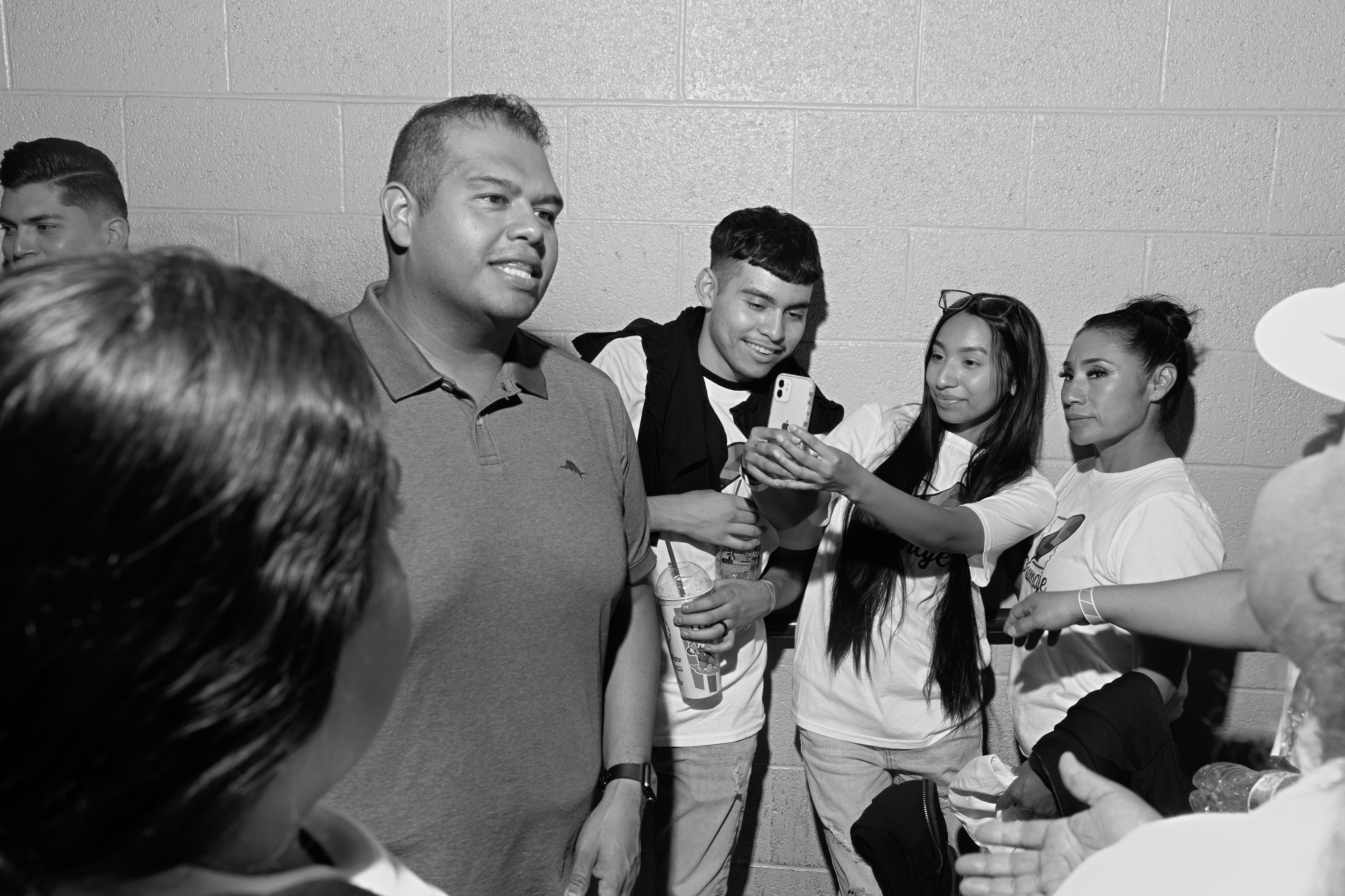
Chávez told me this experience speaks for many of his constituents. The Democratic Party “has always been their safe haven,” he said. But today, he continued, progressives have adopted a “no-holds-barred mentality” on social issues that leaves many Hispanic voters—religious, patriotic, culturally conservative voters—questioning whether they still belong.
“There are individuals in my party who believe these voters are always going to be there for us. They take them for granted,” Chávez said. “That’s why I think this could get a lot worse.”
For all the baggage saddling the state GOP—a proud conspiracy theorist as chair; a trio of prominent election deniers running for statewide office—the party’s consultants and strategists are making real inroads in the Hispanic community. They are hiring Hispanic staffers, spending money on Spanish-language media, investing heavily in grassroots infrastructure. This matches descriptions I heard everywhere else: Republicans can sense that the door is opening, and they are preparing to barrel through it.
“I’m telling you,” Chávez said, “if we don’t do something about it, we’re going to lose a big part of this vote.”
Back at El Portal, Earl and Mary Rose Wilcox’s restaurant in South Phoenix, the warnings are the same. One woman, a longtime progressive activist named Petra Falcon, tells me that Hispanics “have no idea what Democrats really stand for anymore.” Anita Ritter, who serves as the secretary of the American Legion post next door, says she doesn’t know of many of her members who still vote for Democrats.
And then there is Luis Acosta. A respected Democratic campaign consultant, Acosta is also a so-called Dreamer. His mother brought him to the U.S. when he was 2; his earliest memory is crawling under the chain-link border fence. Inspired by Obama’s candidacy, Acosta threw himself into Democratic politics. He helped elect numerous candidates to office. But now, he tells me, he’s “absolutely done” helping the Democratic Party win elections.

“People are tired of being taken for granted. Tired of being ignored for two years and then pandered to when it’s election time. Tired of being in the shadows. Just tired,” Acosta says. “There’s no other way to put it. We’ve supported the Democrats my whole life. Now, we want to know: Are we more than a talking point to you?”
In the corner booth, Earl and Mary Rose look distressed. Earl tells me this kind of talk has been pervasive in his restaurant and his neighborhood since Biden took office. And now they’re even hearing it at home: Two of Earl’s grandsons voted for Trump in 2020. One of them, Earl says, got hooked by the pandemic-era fights over public-education policy and is now a Tucker Carlson devotee; the other grandson, he says, is “less dogmatic” but exasperated by the left’s fixation on social justice.
Mary Rose confesses to feeling a certain pessimism. She and Earl spent a generation building a community, organizing a vote, working to translate raw Hispanic numbers into real political influence. Yet they are confronting the same harsh realities today, about power and patronage, that they fretted over 23 years ago. Wins and losses are not the measure; Democrats could sweep Arizona’s statewide races against an unpalatable bunch of Republicans this fall, but it won’t quiet the feeling that the Wilcoxes’ dream is slipping away. They have so much of what they wanted—an engaged base, a hard-won 11 electoral votes, a Democrat in the White House—and so little to show for it.
“Maybe the best we can hope for is that these voters”—Mary Rose nods toward one of her adult grandsons nearby—“become independents, and we fight for them on a race-by-race basis,” she says. “And honestly, that’s a win for Republicans.”
